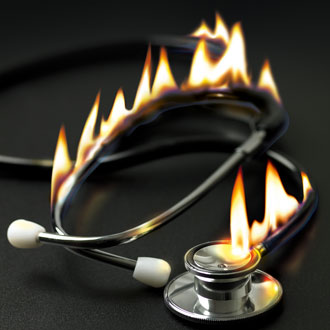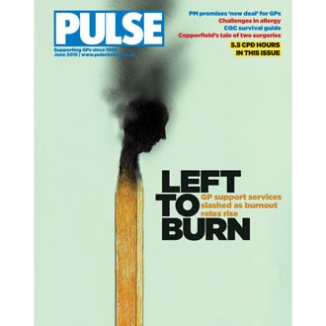Stressed GPs may finally get help as national support service

A new national support service for all hard-pressed GPs will launch from next April, in what could be a major step forward for Pulse’s long-running campaign to highlight soaring rates of burnout amongst the profession.
NHS England chief executive Simon Stevens will announce a new ‘national service specification’ that will be rolled out regionally to help GPs with ‘burnout and stress’.
Pulse has been demanding that NHS bosses bring in a comprehensive occupational health service for all GPs across the country, since we conducted the largest ever survey of GP burnout in the UK in 2013.
A follow-up survey this year showed that 50% of GPs are at high risk of burnout, up four percentage points from the same survey two years ago.
The exact specifications of the new new GP support service remain unclear, but NHS England says it will tackle ‘varying levels of follow-up services depending on local commissioning arrangements by CCGs’.
It will build on programmes that have been successfully developed in some areas already, such as the Practitioner Health Programme (PHP) which provides confidential counselling to GPs in and around London.
The new scheme is part of of a £5m programme to improve the health of NHS staff and reduce sick leave, although NHS England could not specify how much of this would be spent on tackling GP burnout and GP leaders expression caution until the full details are released.
Mr Stevens will say later today: ‘When it comes to supporting the health of our own workforce, frankly the NHS needs to put its own house in order. And at a time when the pressures on GPs have never been greater, we need to extend the local practitioner health programmes that have been shown to help GPs stay healthy and get back to work when sick.’
In making today’s announcement, NHS England acknowledged that ‘increased pressures in general practice are one of the reasons why GPs leave the profession’ and said the new scheme will be developed in conjunction with the GPC and the RCGP.
Related articles:
Revealed: The rising tide of GP burnout as NHS cuts support
Medical director of PHP and former RCGP chair Professor Clare Gerada – herself a long-time champion for GP mental health – praised Pulse’s Battling Burnout campaign for ‘shifting the prevailing wind’.
She said: ‘Pulse has done an excellent job, it has shifted the prevailing wind… It is good that Simon Stevens has listened, it is excellent news for once.’
She added: ‘Anything that acknowledges that there needs to be a confidential space for GPs to really re-energise if they have got serious problems and get help… can only be a good thing.’
Also praising the campaigning work of Pulse, GPC deputy chair Dr Richard Vautrey said Mr Stevens’ comments seemed to signal a more comprehensive support for GPs than previous plans to fund it only when performance issues were identified.
He said: ‘If the level of support that’s available to GPs in London is rolled out nationally, that would be a great improvement.’
But he added there was as yet too little detail available to know whether the national specification would be satisfactory, including on whether it would also cover staff at GP practices or to what extent CCGs would be expected to foot the bill.

Pulse’s June issue
RCGP chair Dr Maureen Baker said that better access for GPs to occupational health services was ‘a positive step forward’. She added: ‘It truly is a case of healthier doctors providing safer patient care and being better for patients.’ The College warned in July that GP fatigue was jeopardising patient safety on a ‘widespread scale’
Since 2013, Pulse has highlighted unprecedented pressure on GPs, urging GPs to write to their local MP, sending NHS England chair Professor Grant several letters regarding the issue and highlighting the problem to the national press.
Visit Pulse Reference for details on 140 symptoms, including easily searchable symptoms and categories, offering you a free platform to check symptoms and receive potential diagnoses during consultations.









